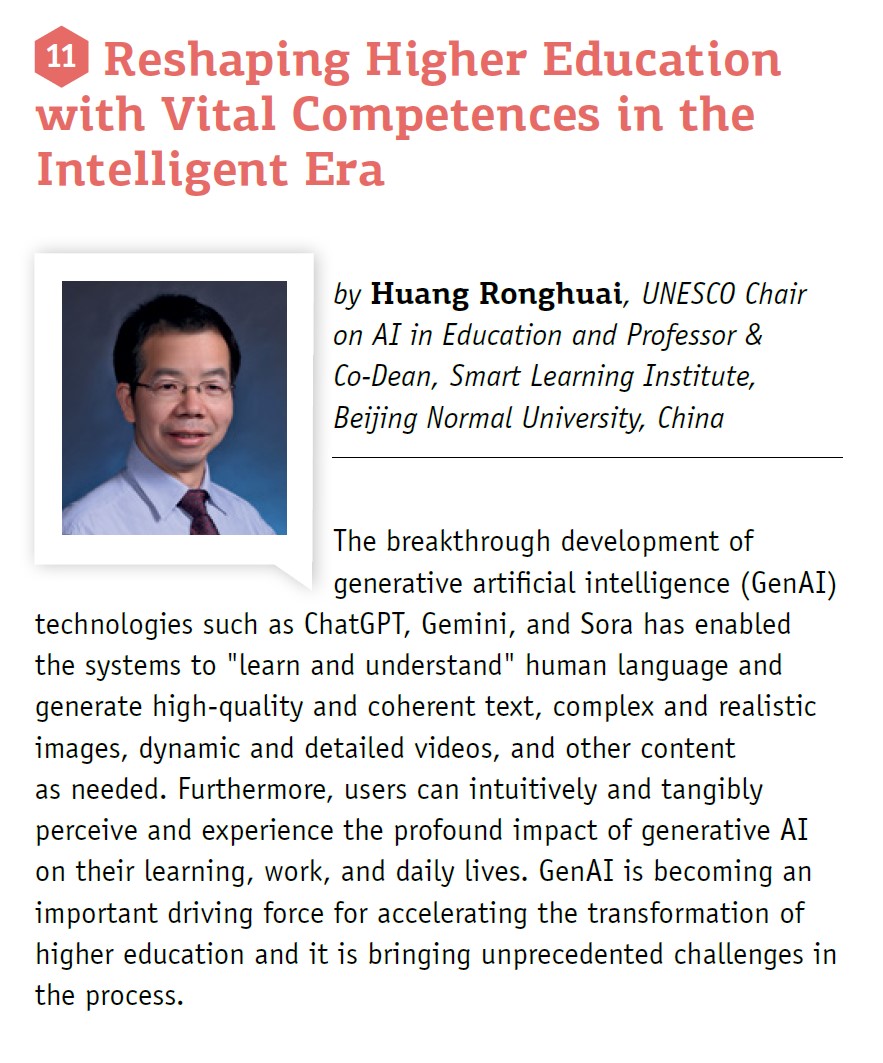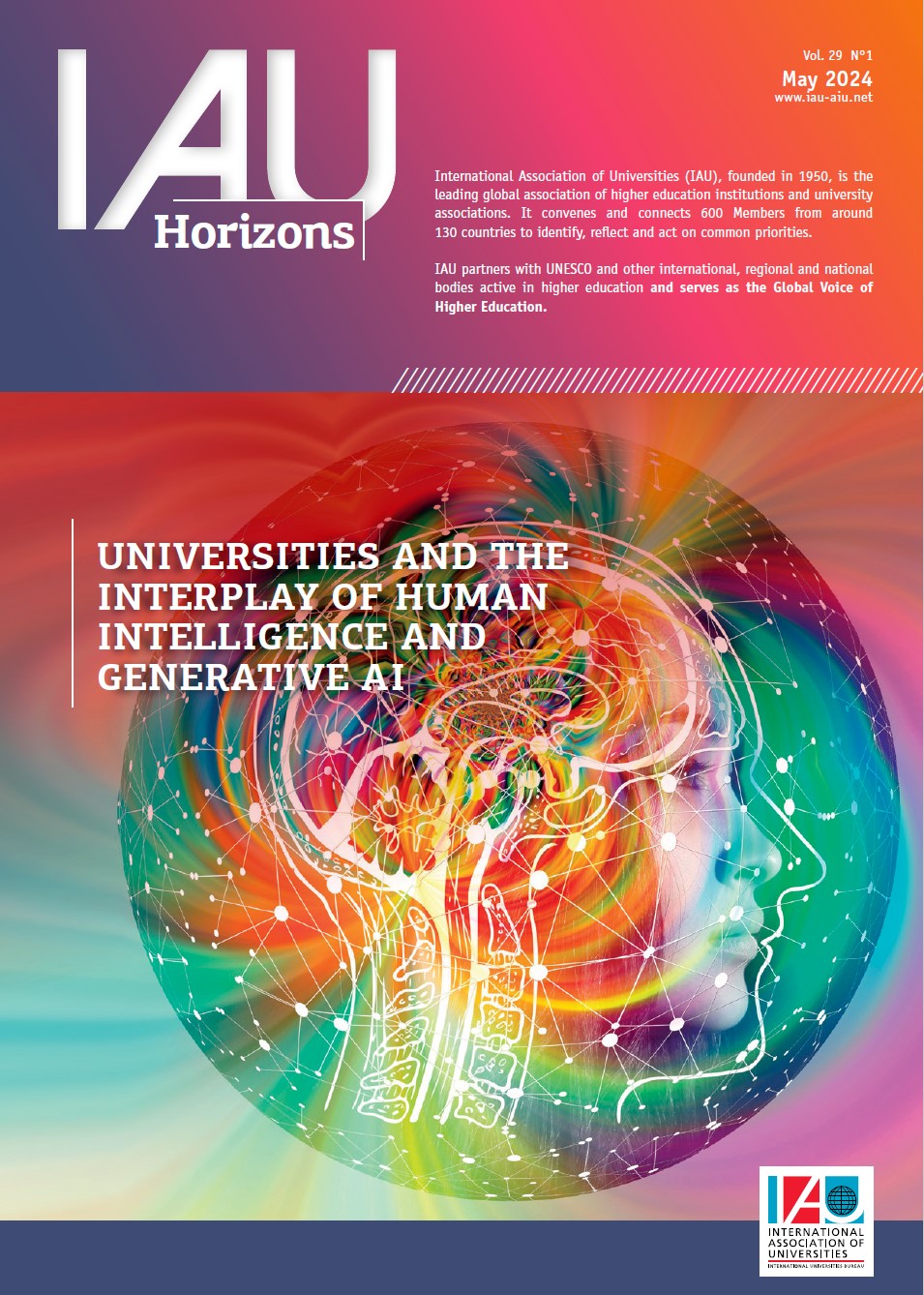黄荣怀教授在国际大学联盟会刊发文,展望智能时代学习者所需的关键能力
发布时间:2024-06-27 09:59作者:admin来源:北师大智慧学习研究院点击量:


以下是文章的中文版:
生成式人工智能技术(如ChatGPT、Gemini和Sora)的突破性发展,已能够“学习和理解”人类的语言,并根据需求生成高质量且连贯的文本、复杂逼真的图像、动态细致的视频等内容。人们能够直观且深切地感知和体验生成式人工智能对他们学习、工作和日常生活产生的深远影响。生成式人工智能正成为加速高等教育转型的重要推动力,同时也带来了前所未有的挑战。一方面,生成式人工智能的出现减少了高等教育机构内许多简单、重复和标准化手动任务的数量,为创新性研究和个性化教学提供了更多的时间和资源。另一方面,它也为高等教育带来了一系列伦理挑战,包括批量工作岗位的消失,作业“作弊”与学术“剽窃”带来的教育诚信危机,以及人机协同“生活”形成的科技伦理等。面对智能技术的持续迭代,我们应认识人工智能变革教育的内在逻辑,重新思考智能时代教育观念的变化,把握高等教育培养新一代公民“关键能力”的关切点,促进高等教育的高质量发展。
为迎接智能时代的来临,无论是教师、家长,还是社会各界都需适应教育教学理念的变革,包括对于知识、学习、课程和教学等认识的根本性改变,即智能时代教育“新四观”。首先是众创共享的知识观,智能时代的知识具有显著的群智性,人类与智能技术协同生产知识,每个人都成为知识的创造者和传播者。其次是智联建构的学习观,在智联融通的学习环境中,技术在学生学习中扮演关键角色,为多样化学习情境的创生提供了无限可能。再次是融通开放的课程观,课程从单一预设的群体课程转变为多元个性化的跨学科课程,促进学生跨学科学习和整体理解。最后是人机协同的教学观,教师与智能技术共生、共教、共学,基于数据进行个性化教学分析、决策和实施成为常态。
为了适应AI深度融入生产生活各环节,培养智能时代学生的关键能力至关重要,需聚焦五个核心关切:持续终生的自主学习能力、利用人工智能的创新能力、多次灵活就业的适应能力、不确定性状况的处置能力、以及富智能环境中的生存能力。
第一,持续终生的自主学习能力。这是智能时代学习能力的核心,强调高校学生自我效能感和主观能动性的培养,通过自我规划、决策、监控、管理和评价,主动维持和提升在大学期间乃至一生的学习状态。
第二,利用人工智能的创新能力。创造性地使用人工智能不仅要求利用过往经验解决新问题、整合多视角创新解法,还强调将所学知识和经验应用于解决现实生活挑战。高等教育应培养学生的批判性思维和问题解决技能,引导他们利用先进技术工具开展原创研究和实际应用,释放创新创造潜力。
第三,多次灵活就业的适应能力。这项能力确保学生能适应多变的工作环境和多样的职业要求,能在不同角色和职责之间灵活转换。智能时代,学生需要具备扎实的专业技能和跨学科素养,有效适应不同行业的动态发展,应对社会需求变化。
第四,不确定性状况的处置能力。这项能力强调学生能够在复杂环境中作出明智决策,坚持科技向善原则,确保技术创新造福人类并尊重个人隐私、保障数据安全、促进社会公平正义。同时,这还包括应对社会不确定性,要求学生拥有批判性思维和风险评估能力,在不断变化的社会经济环境中作出明智决策。此外,还要求学生具备科技伦理意识和伦理判断能力,理解并解决智能时代的安全和伦理问题,合理使用科技资源,保护个人隐私和信息安全,了解技术发展可能带来的伦理困境和社会影响。
第五,富智能环境中的生存能力。这项能力强调学生在富智能环境中与机器紧密协作的能力,需发挥人的主体性和能动性,整合人类的创造性思维与机器的多任务高效处理能力,实现人机协同的最佳表现。
在知识快速更新、技术频繁迭代的时代,培养学生的这些关键能力尤为重要。这些能力的综合发展将帮助学生适应高等教育的变化,并为智能时代的成功奠定坚实基础。通过重塑教育理念,强调培养持续终生的自主学习能力、利用人工智能的创新能力、多次灵活就业的适应能力、不确定性状况的处置能力、以及富智能环境中的生存能力等,学生将能适应未来日益复杂多变的挑战,为社会进步与发展作出积极贡献。
英文原文:
Reshaping Higher Education with Vital Competences in the Intelligent Era
The breakthrough development of generative artificial intelligence (GenAI) technologies such as ChatGPT, Gemini, and Sora has enabled the systems to “learn and understand” human language and generate high-quality and coherent text, complex and realistic images, dynamic and detailed videos, and other content as needed. Furthermore, users can intuitively and tangibly perceive and experience the profound impact of generative AI on their learning, work, and daily lives. GenAI is becoming an important driving force for accelerating the transformation of higher education and it is bringing unprecedented challenges in the process.
On the one hand, its emergence has led to a gradual reduction in many simple, repetitive, and standardized manual tasks within higher education institutions, such as administrative paperwork, data entry, and routine grading, providing more time and resources for innovative research and personalized instruction. Additionally, generative AI brings a series of ethical challenges to higher education, including the disappearance of certain positions, the crisis of academic integrity caused by homework “cheating” and academic “plagiarism”, and the technological ethics formed by human-machine coexistence. In response to the continuous evolution of intelligent technology, we should recognize the inherent logic of AI’s role in transforming education, rethink the changes in educational concepts in the era of intelligence, grasp the concerns of cultivating the “vital competence” of the new generation of citizens in higher education, and promote the high-quality development of higher education.
To prepare for the revolutionary effects of the intelligent era, whether educators, parents, or society at large, everyone needs to adapt to fundamental changes in educational philosophy, especially the conceptual changes regarding knowledge, learning, curriculum, and instruction. The first change is Knowledge Created beyond Experts, which we should learn in schools. In the intelligent era, knowledge demonstrates substantial collective wisdom. Humans collaborate with AI technologies to produce knowledge, each becoming a producer and disseminator of knowledge. The second change is Learning Coupled to Digital Environments, where technology serves an important role for students. In an environment of intelligent interconnectivity, digital technology offers endless possibilities for creating various learning scenarios. The fragmentation and dynamism brought about by multi-space interconnection and cross-space interaction require students to engage actively in deep learning. Another change is Curriculum Integrated with Multiple Subjects, fostering interdisciplinary learning and holistic understanding among students. This shift transforms the curriculum from singular and rigidly preset group courses to diverse and personalized courses across multiple subjects. This leads to the formation of a more comprehensive, interconnected, and integrated curriculum system. The last change is Instruction Assisted by Intelligent Systems, facilitating a symbiotic relationship between teachers and AI technology. Teachers coexist, collaborate, and learn with AI technology, enabling personalized instruction analysis, decision-making, and implementation based on data to become normalized.
In order to adapt to the deep integration of generative AI into various aspects of production and life, it is necessary to cultivate students’ vital competencies in the intelligent era, focusing on five key concerns: active learning, creativity, adaptability in employment, and the ability to handle various situations and environments.
The first competence lies in Active Learning during Lifetime. This skill will emerge as the central learning aptitude in the intelligent era, highlighting student’ sense of self-efficacy and subjective initiative in higher education. Through various behaviors such as self-planning, self-decision-making, self-monitoring, self-management, and self-evaluation, individuals can actively uphold and refine their learning trajectory during their time at the university and throughout their lives.
The second competence involves Creatively Using AI. This ability not only underscores the capacity to utilize past experiences for novel problem-solving and integrate diverse viewpoints for innovative solutions but also emphasizes applying acquired knowledge and experiences to address real-world challenges in everyday life. Higher education should foster and nurture students’ critical thinking and problem-solving skills, directing them toward conducting original research and practical applications with advanced technological resources. This competence may unlock their potential for innovation and creativity.
The third competence is Adaptability of Flexible Employment. This ability ensures that students can adapt to diverse work environments and meet various job requirements. They can seamlessly transition between different roles and responsibilities to fit various work scenarios and occupational demands. In the intelligent era, students will require strong professional skills and interdisciplinary literacy to effectively adapt to the dynamic developments across different industries and respond to changes in social needs.
The fourth competence is Resilience to Uncertain Circumstances. This skill involves cultivating the ability to make wise decisions in complex environment and adhere to the principle of technology for good, ensuring that technological innovation benefits humanity while respecting individual privacy, safeguarding data security, and promoting social fairness and justice. Moreover, it entails coping with social uncertainties, requiring students to possess critical thinking and risk assessment abilities to make wise decisions in constantly changing social and economic conditions. Furthermore, it involves the ability for security and technological ethics, where students can understand and address safety and ethical issues in the intelligent era, possess technical ethics awareness and ethical judgment abilities, use technology resources reasonably, protect personal privacy and information security, and understand the ethical dilemmas and social impacts that technological developments may bring.
The fifth competence involves Survival in Rich AI Environments. This skill describes the close collaboration between humans and machines within rich AI environments. While prioritizing individual subjectivity and initiative maximizes human creativity and the multitasking efficiency of machines. By combining the strengths of both humans and machines, optimal performance is achieved.
In this era of rapidly updating knowledge and frequently iterating technology, cultivating students’ vital competencies becomes particularly crucial. The integrated development of these competencies will help students adapt to changes in higher education and lay a solid foundation for success in the intelligent era. Through reshaping educational philosophies and emphasizing the cultivation of competencies, such as being active during their learning throughout Life, creativity leveraging of AI, adaptability to flexible employment, resilience to uncertainty, and thriving in rich AI environments, students can allow to meet the challenges of an increasingly complex and changing knowledge production in the future and make positive contributions to the progress and development of society.
国际大学联盟(International Association of Universities - IAU)成立于1950年,是在联合国教科文组织支持下创立的全球高等教育机构和大学联盟领头组织。IAU拥有来自130余个国家和地区的600多家会员单位,通过专业知识与趋势分析、出版物与门户平台、咨询服务、同行学习、活动举办以及全球倡导等方式服务全球高等教育界。
查看本期IAU Horizons: https://www.iau-aiu.net/IMG/pdf/iau_horizons_vol.29_1_en__v5.pdf

